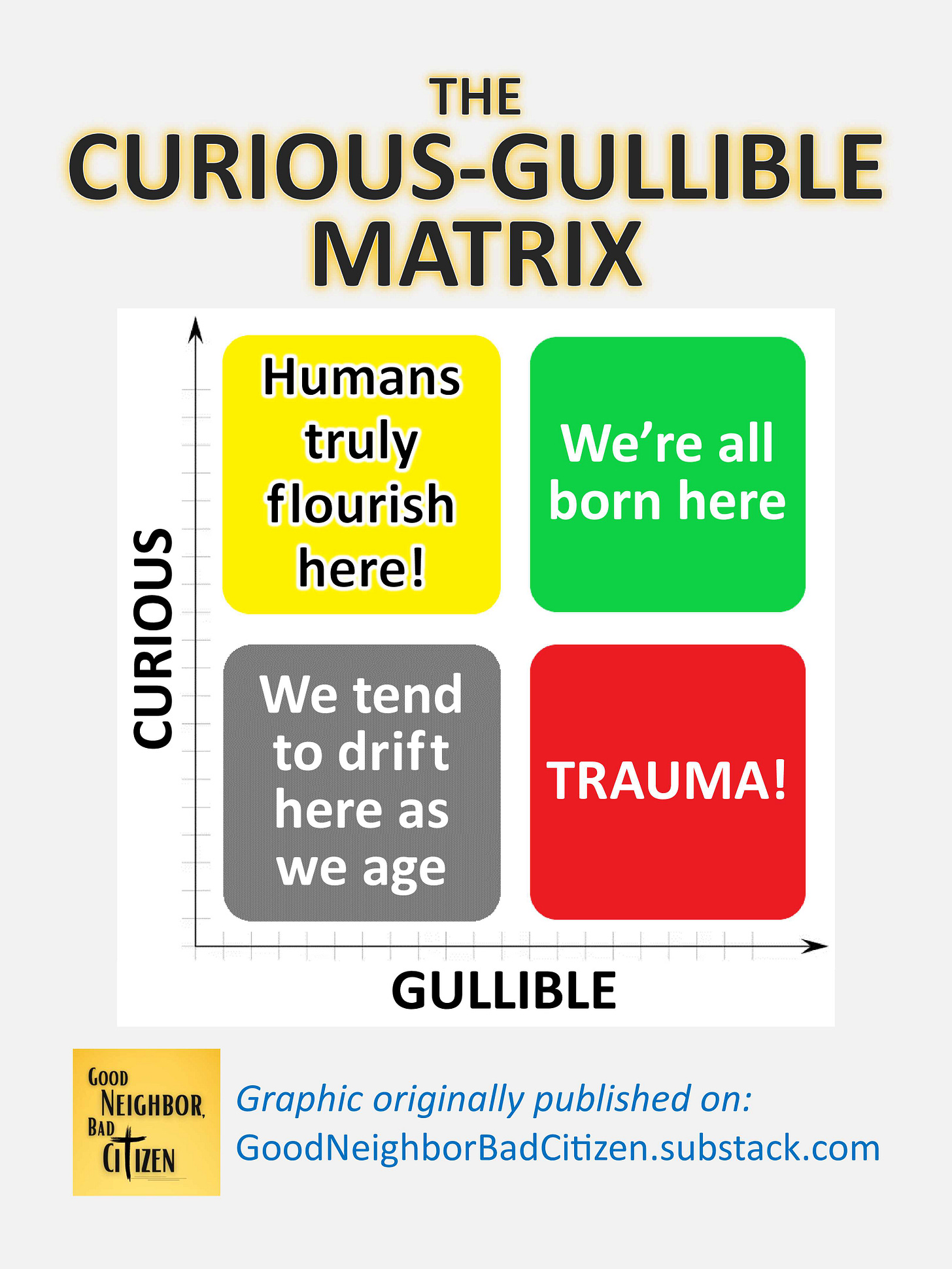Curious? Gullible? It’s Matrix Time!
The Unexpected Highlight of My Recent Podcast Interview Has Deep, Gospel Connections
Thanks to the wonderful audience response from last week’s appearance on “The Jeff Macolino Podcast” (ep. 158), I’ve created a visual aid for the most talked-about part of the conversation: The Curious-Gullible Matrix!
Here’s a graphic that wasn’t available for the audio-only podcast (which you can hear on Spotify, Apple, ListenNotes, Amazon and Podchaser):

And here’s a condensed transcript of my pertinent remarks during the podcast:
Little kids are born high-curious, but also high-gullible. So they’re exploring and they’re open to things. Little kids especially, they act on emotion and imitation. … They can be manipulated very easily.
And as we mature, we get tired of being gullible, and so we try to reduce that. But as we reduce that, we also reduce the curious. So, as adults, we wind up low-gullible but also low-curious.
Now, when you’re traumatized, you get shoved into the wrong part of the matrix entirely, where you’re low-curious, but high-gullible. …
And the thing is, as an adult it takes a lot of effort, but what you’re trying to do is get to the quadrant of the matrix that’s high-curious and low-gullible. …
You become more mature in your psyche when you’re able to start climbing the ladder of curious again without becoming a doggone fool.
Does the Curious-Gullible Matrix square with Jesus’ teachings?
There’s a deeper position that I didn’t get into during the podcast: The Curious-Gullible Matrix connects to the Gospels!
Jesus spends a lot of time with people who are set in their ways, who have fomented comfortable prejudices. It’s a type of jadedness, a malaise at the way things are, a default acceptance of social-status structures.
Jesus warns people about this “leaven,” meaning corruption, of the high-status order givers, the Pharisees and King Herod (Mark 8:15). Jesus laments that some people will cling so blindly to their “old wine” that they won’t even consider an alternative (Luke 5:39).
These, indeed, are people who’ve migrated to the bottom-left quadrant of the Curious-Gullible Matrix, or even those who’ve gotten stuck in manipulation (the bottom-right quadrant).
So, should these adults reclaim the upper-right quadrant of early childhood? It may be tempting to say, “Yes,” in light of Jesus saying that only those who’ve accepted heaven like children can reach such happiness (Matthew 18:1-5 & 19:13-14; Mark 10:13-16; Luke 18:15-17).
But does that mean Jesus wants people to regress in their maturity? Considering how He implores people to learn virtuous attitudes and behaviors, and to be wary of the messages they receive from alleged authorities, the answer is a firm, “No.”
The childlike qualities we should recapture, and those we should leave in our pasts
Jesus celebrates the humility and appropriate curiosity of children, not their lack of moral capacity. Remember, small children act very much on emotion and imitation, and haven’t built the cognitive infrastructure to be fully responsible for their actions.
Jesus isn’t encouraging us to return to moral ignorance and lack of responsibility. Adults shouldn’t revert to action on emotion and imitation, nor become “a doggone fool” in seeking the external validation granted by social orders.
A better course of attitude and action is to venture up the axis of Curious, bringing with us our capacities for moral virtue, resilience, understanding, “street smarts,” courage, and all the other dignity-affirming lessons and life skills of human maturity.
We need to encounter “new wine” without trying to force it into “old wineskins” (Matthew 9:17; Mark 2:22; Luke 5:37-38).
Heaven beckons those in the upper-left quadrant of the Curious-Gullible Matrix: those who have met their human limitations with an optimistic-but-realistic seeking of a God who both graces their innermost beings and calls them to step out of their rigidly rational lives.
I’m curious … Are you?
The full Curious-Gullible Matrix wasn’t part of my book, Good Neighbor, Bad Citizen, but I do emphasize in the last line of the Introduction: “All who are curious are invited to pray and grow from Jesus’ model of true, undying, neighborly love.”
Choosing “neighbor” over “citizen” as your highest social value, takes effort and appropriate curiosity. Low-curious folks tend to be very pliable citizens; avoid that condition!
And I’m curious to know what YOU think about the Curious-Gullible Matrix and how I’ve presented it. Express your thoughts in the Comments section below …




“The full Curious-Gullible Matrix wasn’t part of my book, Good Neighbor, Bad Citizen” ...
Maybe there’s a Good Neighbor, Bad Citizen II in the future? It’s a worthy topic, and this was a worthy read!